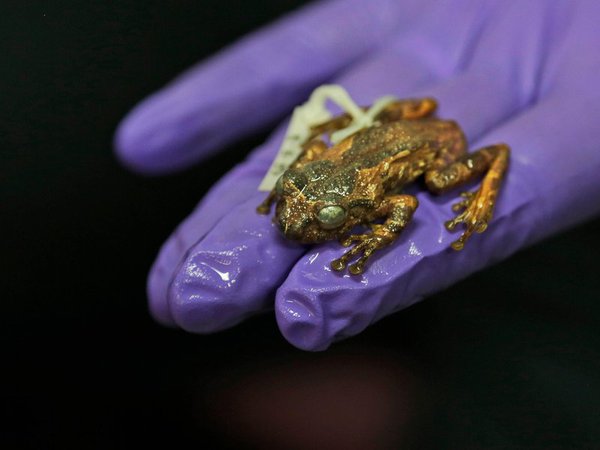An odd tree frog thought to be extinct rediscovered in India


A free daily email with the biggest news stories of the day – and the best features from TheWeek.com
You are now subscribed
Your newsletter sign-up was successful
Biologists in northeastern India were excited in 2007 when they saw a tree frog, the Polypedates jerdonii, for the first time in the wild since 1870. After researching the amphibian, they found that it is from a new genus, and christened it the Frankixalus jerdonii.
In a new study published in the journal PLOS ONE on Wednesday, the team describes how females attach their eggs to the insides of tree hollows, which hold pools of water. After the tadpoles hatch and fall into the water, the females feed them unfertilized eggs until they turn into froglets. Study co-author Ines Van Bocxlaer of the Amphibian Evolution Lab in Belgium told National Geographic that its DNA, feeding behavior, and anatomy "shows the species represents a deep evolutionary split in tree frog evolution."
The team did not observe the females dropping off eggs at the trees, and they plan to do further research to determine how the eggs are delivered. The females do have a tube-like extension to their reproductive organs that would allow them to lay eggs individually, and it's also possible that females may feed more than just their own young. James Hanken, curator of herpetology at Harvard University's Museum of Comparative Zoology, told National Geographic it's likely this isn't the last time a new genus will be found in the area. "This part of southeast Asia, in particular, is poorly inventoried," he said. "I wouldn't be at all surprised if additional species were discovered."
The Week
Escape your echo chamber. Get the facts behind the news, plus analysis from multiple perspectives.

Sign up for The Week's Free Newsletters
From our morning news briefing to a weekly Good News Newsletter, get the best of The Week delivered directly to your inbox.
From our morning news briefing to a weekly Good News Newsletter, get the best of The Week delivered directly to your inbox.
A free daily email with the biggest news stories of the day – and the best features from TheWeek.com
Catherine Garcia has worked as a senior writer at The Week since 2014. Her writing and reporting have appeared in Entertainment Weekly, The New York Times, Wirecutter, NBC News and "The Book of Jezebel," among others. She's a graduate of the University of Redlands and the Columbia University Graduate School of Journalism.
-
 The 8 best TV shows of the 1960s
The 8 best TV shows of the 1960sThe standout shows of this decade take viewers from outer space to the Wild West
-
 Microdramas are booming
Microdramas are boomingUnder the radar Scroll to watch a whole movie
-
 The Olympic timekeepers keeping the Games on track
The Olympic timekeepers keeping the Games on trackUnder the Radar Swiss watchmaking giant Omega has been at the finish line of every Olympic Games for nearly 100 years
-
 Rubio boosts Orbán ahead of Hungary election
Rubio boosts Orbán ahead of Hungary electionSpeed Read Far-right nationalist Prime Minister Viktor Orbán is facing a tough re-election fight after many years in power
-
 Key Bangladesh election returns old guard to power
Key Bangladesh election returns old guard to powerSpeed Read The Bangladesh Nationalist Party claimed a decisive victory
-
 Epstein files topple law CEO, roil UK government
Epstein files topple law CEO, roil UK governmentSpeed Read Peter Mandelson, Britain’s former ambassador to the US, is caught up in the scandal
-
 Iran and US prepare to meet after skirmishes
Iran and US prepare to meet after skirmishesSpeed Read The incident comes amid heightened tensions in the Middle East
-
 EU and India clinch trade pact amid US tariff war
EU and India clinch trade pact amid US tariff warSpeed Read The agreement will slash tariffs on most goods over the next decade
-
 Israel retrieves final hostage’s body from Gaza
Israel retrieves final hostage’s body from GazaSpeed Read The 24-year-old police officer was killed during the initial Hamas attack
-
 China’s Xi targets top general in growing purge
China’s Xi targets top general in growing purgeSpeed Read Zhang Youxia is being investigated over ‘grave violations’ of the law
-
 Panama and Canada are negotiating over a crucial copper mine
Panama and Canada are negotiating over a crucial copper mineIn the Spotlight Panama is set to make a final decision on the mine this summer
